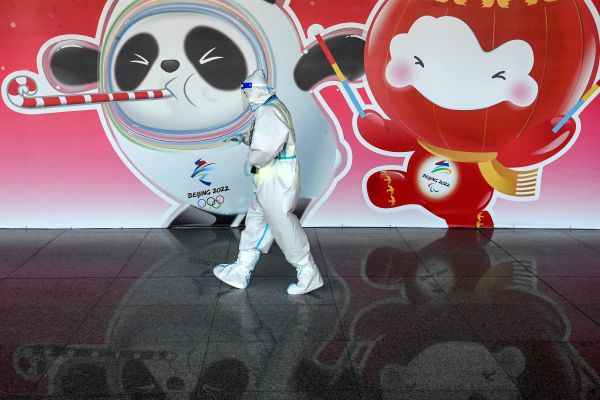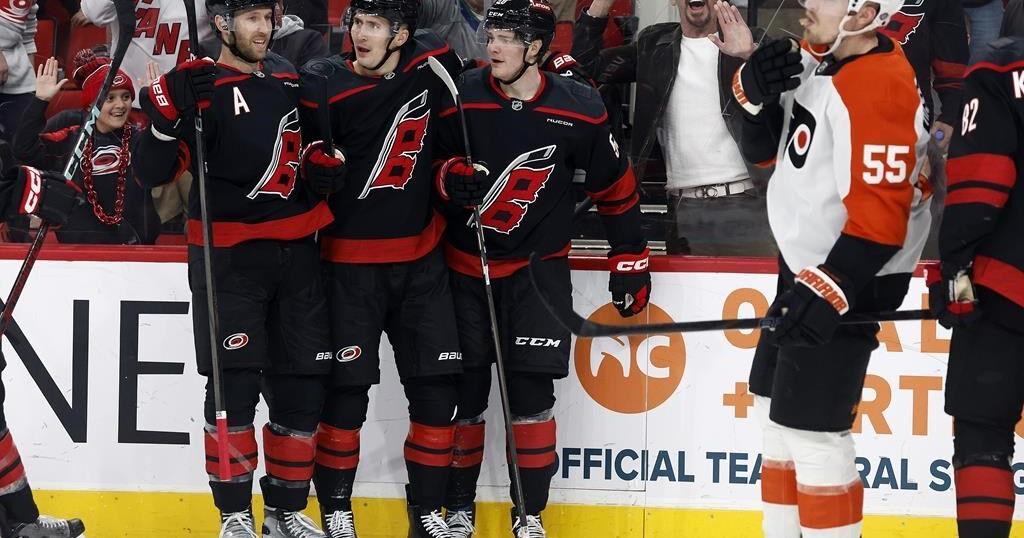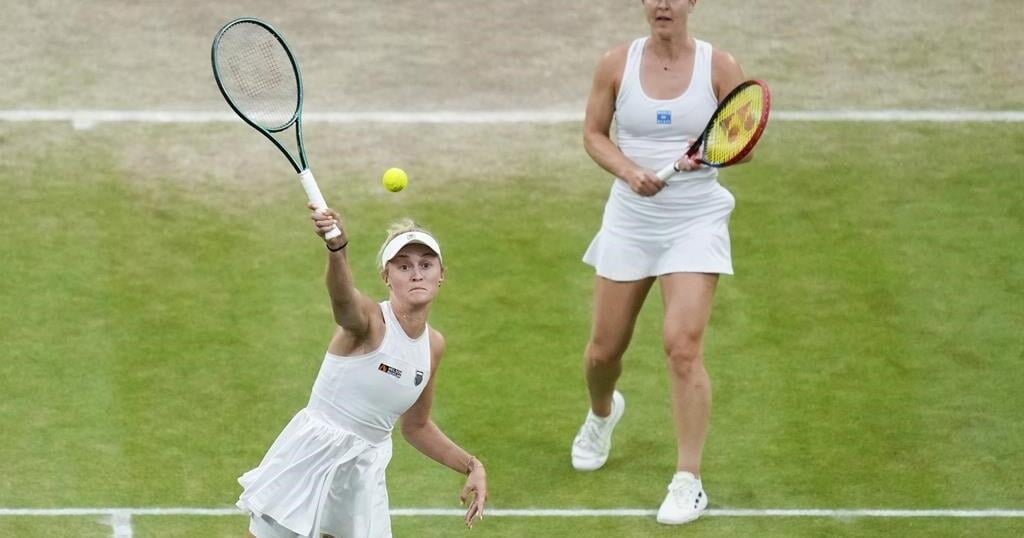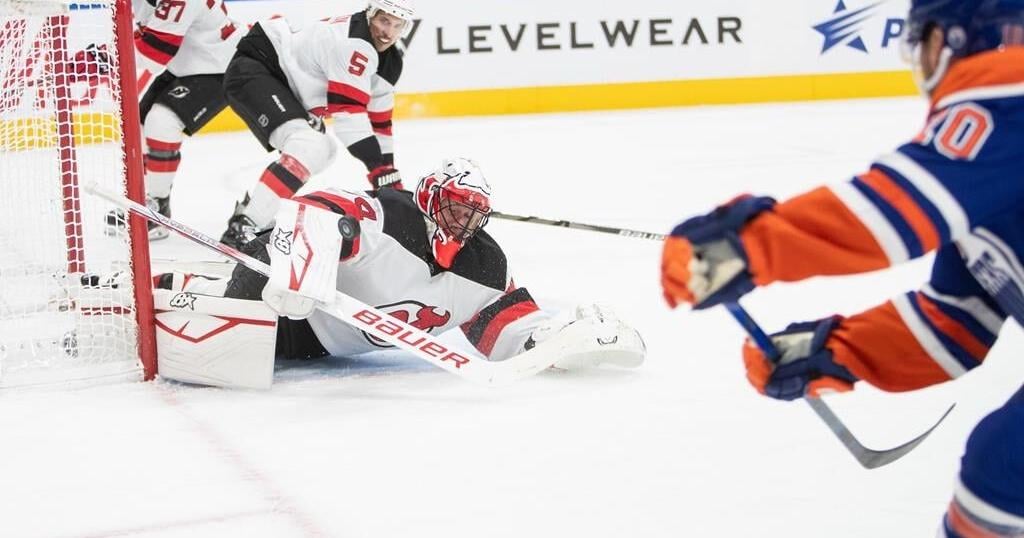RALEIGH, N.C. (AP) — Martin Necas scored a go-ahead goal with 29 seconds left and the Carolina Hurricanes beat the Philadelphia Flyers 6-4 on Tuesday night.
It was the seventh straight win for the Hurricanes, who also got goals from Jack Roslovic, Jordan Martinook, Eric Robinson and Jackson Blake. Seth Jarvis added an empty-net goal in the final seconds.
Necas typically saves his game-winners for overtime, with nine in his career, but he was able to take care of business in regulation with his team-best seventh goal of the season.
Travis Konecny scored two goals and had two assists for the Flyers. Morgan Frost and Owen Tippett also scored for Philadelphia.
Aleksei Kolosov made 28 saves for the Flyers, who trailed 2-1, 3-1 and 4-3 but kept coming back. Carolina’s Pyotr Kochetkov struggled in net allowing four goals on just 16 shots.
Elsewhere in the NHL on Tuesday:
—
SABRES 5 SENATORS 1
BUFFALO, N.Y. (AP) — Bowen Byram and Tage Thompson scored 16 seconds apart to open the third period, and Buffalo snapped a three-game skid with a win over Ottawa.
Byram scored twice, JJ Peterka had two goals and an assist and Ukko-Pekka Luukkonen made 37 saves.
Ridly Greig converted his own rebound in cutting Buffalo’s lead to 2-1 with 7:31 left in the second period. Linus Ullmark made 29 saves in dropping to 1-4 in his past five starts.
Buffalo went up 3-1 on Byram’s second goal 21 seconds into the third period. The defenceman’s shot from inside the blue line sneaked through Ullmark, with the puck rolling down the goalie’s pad, dropping into the crease and trickling across the line. Thompson scored when he crashed the net, was knocked over by defender Jake Sanderson and was lying in the crease when Alex Tuch’s shot went in off his shoulder.
—
MAPLE LEAFS 4 BRUINS 0
TORONTO (AP) — Anthony Stolarz made 29 saves for his first shutout of the season in Toronto’s 4-0 victory over Boston.
Morgan Rielly had a goal and two assists as Toronto connected three times on the power play. William Nylander and Matthew Knies added a goal and an assist each. Mitch Marner had two assists of his own. Steven Lorentz rounded out the scoring into the empty net.
The Leafs played without captain Auston Matthews, who is listed as day-to-day with an upper-body injury.
Jeremy Swayman made 23 stops for Boston, which was coming off consecutive weekend shutouts of the Philadelphia Flyers and Seattle Kraken.
Toronto’s porous 31st-ranked power play scored for the second time in as many games at 8:44 of the second period when Rielly fired through a screen. Nylander banked in his team-leading 10th goal of the season on another man advantage 1:14 later for a 2-0 lead.
The Bruins entered the game 8-0-0 in the regular season against their Atlantic Division rival dating back to Jan. 14, 2023.
—
FLAMES 3 CANADIENS 2 (OT)
MONTREAL (AP) — Matt Coronato scored twice as Calgary came back to defeat Montreal in overtime.
Coronato tied the game with 2:46 remaining in regulation when he cruised into the slot and went off the post and in. He then buried the winning goal seven seconds into the extra period.
Connor Zary also scored for Calgary, which won its second game in seven outings. Dustin Wolf stopped 21 shots.
Joel Armia — with a short-handed goal — and Brendan Gallagher scored for Montreal (4-7-2). Armia also provided an assist, while Sam Montembeault made 32 saves as the Canadiens’ losing streak extended to four games.
Zary opened the scoring with his third 4:20 into the second period when he pounced on a loose puck in the slot and fired a shot past Montembeault.
Gallagher then slipped the puck between Wolf’s pads at 16:23 to level the score with his fifth of the season.
—
BLUES 3 LIGHTNING 2
ST. LOUIS (AP) — Jordan Kyrou, Alexey Toropchenko and Oskar Sundqvist scored to help St. Louis beat Tampa Bay 3-2.
Blues goaltender Jordan Binnington made 21 saves for his 149th career win moving him past Jake Allen for second place in franchise history, just two wins behind Mike Liut’s 151.
Nick Perbix and Victor Hedman scored, and Andrei Vasilevskiy made 20 saves for the Lightning who have lost three straight games.
Kyrou scored his fourth goal of the season 8:51 into the third period to give St. Louis a 3-1 lead.
Toropchenko scored his first goal of the season with 1:35 remaining in the second period to put St. Louis ahead 2-1 after Sundqvist tied the game with his first of the season 7:47 into the period.
—
ISLANDERS 4 PENGUINS 3 (SO)
NEW YORK (AP) — Bo Horvat scored the only goal in a shootout and New York rallied past Pittsburgh 4-3.
New York goalie Ilya Sorokin denied Rickard Rakell, Sidney Crosby and Kris Letang in the shootout and finished with 32 saves. Kyle Palmieri had a goal and an assist for the Islanders, who trailed 3-1 midway through the third period.
Simon Holmstrom and Jean-Gabriel Pageau scored in the third for New York. Horvat had two assists.
Evgeni Malkin had a goal and an assist to lead Pittsburgh. Crosby got his 598th career goal, and Michael Bunting also scored. Rakell added two assists.
Alex Nedeljkovich stopped 23 shots for the Penguins, who have lost seven of nine. They won their previous two following a six-game skid.
—
KINGS 5 WILD 1
ST. PAUL, Minn. (AP) — Trevor Lewis scored twice, Kevin Fiala added another on the power play and Los Angeles beat Minnesota 5-1.
Warren Foegele and Quinton Byfield also scored for Los Angeles, which was playing the second night of a back-to-back after a 3-0 win in Nashville a night earlier. David Rittich made 23 saves for the Kings.
Fiala, who was traded to Los Angeles in 2022 by Minnesota for a first-round pick draft pick and defenceman Brock Faber, scored his seventh goal of the season. He now has three goals and six assists in his last seven games against the Wild.
Minnesota, which had won three in a row, opened the scoring in the second period on Zach Bogosian’s first goal of the season. Goaltender Filip Gustavsson stopped 23 shots for the Wild.
—
JETS 3 UTAH 0
WINNIPEG, Man. (AP) — Nino Niederreiter scored twice in his 900th NHL career game and Connor Hellebuyck made 21 saves to help Winnipeg defeat Utah 3-0.
It was Hellebuyck’s second shutout of the season and 39th of this career.
Gabriel Vilardi also scored for the Jets. Adam Lowry assisted on both goals by Niederreiter.
Utah ended a run of picking up points in three consecutive games (1-0-2).
Karel Vejmelka stopped 25 shots for Utah in its second stop on a four-game road trip.
Jets winger Kyle Connor had his franchise-record, season-opening points streak end at 12 games.
—
AVALANCHE 6 KRAKEN 3
DENVER (AP) — Arturri Lehkonen scored the go-ahead goal on a power play in his season debut and Nathan MacKinnon had five assists as Colorado beat Seattle 6-3.
Mikko Rantanen added two goals for the Avalanche, who snapped a three-game losing streak. Ivan Ivan, Nikolai Kovalenko and Chris Wagner also scored for Colorado.
Cale Makar had two assists but the star defenceman barely played in the second half of the game and appeared to be slowed by an apparent injury during a brief shift.
MacKinnon and Makar extended their season-opening point streaks to 13 games.
Lehkonen played for the first time since off-season shoulder surgery.
Jared McCann, Jaden Schwartz and Brandon Montour scored for the Kraken.
—
CANUCKS 5 DUCKS 1
ANAHEIM, Calif. (AP) — Brock Boeser, Danton Heinen and Kiefer Sherwood had a goal and an assist apiece, and Quinn Hughes recorded his 300th career assist in Vancouver’s victory over Anaheim.
Jake DeBrusk and Elias Pettersson also scored and Hughes had three assists for the Canucks, who have won six of eight. Kevin Lankinen made 21 saves in Vancouver’s sixth consecutive win over the Ducks.
Olen Zellweger scored a power-play goal early in the first period for Anaheim, which has lost seven of nine. Lukas Dostal stopped 31 shots.
Canucks goalie Thatcher Demko took shots from teammates again after the morning skate, and he could return to practice this week. The Southern California native and 2023-24 Vezina Trophy finalist hasn’t played this season due to a knee injury incurred late last season.
—
SHARKS 2 BLUE JACKETS 1 (OT)
SAN JOSE, Calif. (AP) — Alex Wennberg scored 3:11 into overtime and San Jose celebrated the return of No. 1 overall draft pick Macklin Celebrini with a win over Columbus.
Defenceman Jack Thompson scored his first career goal for the Sharks (4-8-2), who entered the night with the worst record in the NHL. San Jose has won four of five.
Celebrini, the top pick in the 2024 NHL draft, missed 12 games with a hip injury he sustained in the season opener Oct. 10 — an injury first incurred during the pre-season. Celebrini didn’t score and missed a shot early in overtime.
San Jose goalie Vitek Vanacek was fantastic in net, making 49 saves.
Blue Jackets right wing Kirill Marchenko scored for the second consecutive game. Columbus (5-6-1) has lost three straight.


:format(jpeg)/cloudfront-us-east-1.images.arcpublishing.com/tgam/ULLCY3KNEFOZJCD36YUQSLL5PY.jpg)
:format(jpeg)/cloudfront-us-east-1.images.arcpublishing.com/tgam/FYHGPFOTAJAE7DLKEAQTUWO4VA.jpg)
:format(jpeg)/cloudfront-us-east-1.images.arcpublishing.com/tgam/PO6A6LIEJRNHZH2E4MEAH34V2M.jpg)
:format(jpeg)/cloudfront-us-east-1.images.arcpublishing.com/tgam/BF2IEY3IBRP6FDWGCNCLYN2EIY.jpg)
:format(jpeg)/cloudfront-us-east-1.images.arcpublishing.com/tgam/R2BI76XMTZP4PKWKJ4TO432XUQ.jpg)
:format(jpeg)/cloudfront-us-east-1.images.arcpublishing.com/tgam/KI3S6WJUJVNBJMZPKIOFS6IKKM.jpg)
:format(jpeg)/cloudfront-us-east-1.images.arcpublishing.com/tgam/LRBS3MAGVVLNXKUJRUL6XNVOUA.jpg)
:format(jpeg)/cloudfront-us-east-1.images.arcpublishing.com/tgam/WAI4NVNHVBKRTCL6L6Y35S3HAM.jpg)



:format(jpeg)/cloudfront-us-east-1.images.arcpublishing.com/tgam/W6CSOGUCGNAS7DB6VCG2GDMNCY.jpg)
:format(jpeg)/cloudfront-us-east-1.images.arcpublishing.com/tgam/7LI36YM2DJLTXJCMBKFU3AAOOA.jpg)
























